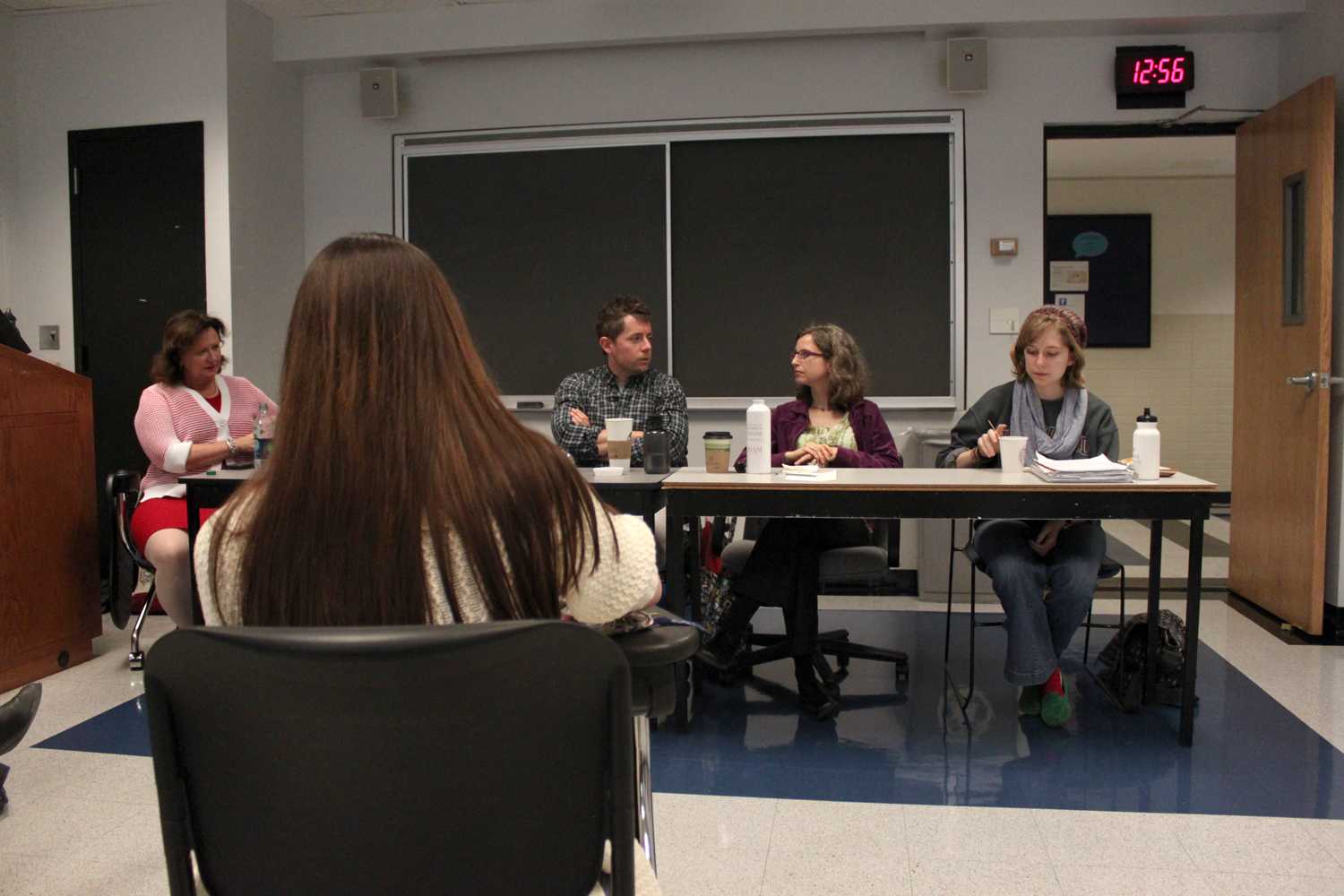Theology Roundtable Discusses Vagina Monologues
April 15, 2013

On April 11, Fordham College at Lincoln Center (FCLC) clubs ISIS and Rainbow Alliance held a roundtable discussion titled “The Pink Elephant in the Room: Women, Faith and the Vagina Monologues.” The discussion included the Rev. Mary Julia Jett, an Episcopal Deacon, Associate Professors of Theology Benjamin Dunning and Karina Hogan, Associate Director of Campus Ministry Carol Gibney and Dorie Goehring, FCLC ’13.
The roundtable discussed the role of theology within “The Vagina Monologues” as well as the reception of staging the play at FCLC. President of ISIS, Amy Bucknam, FCLC ’14, started off the discussion by asking the panelists what they had heard or read of the reception of “The Vagina Monologues” in religious themed pieces. Goehring said that the Cardinal Newman Society did not approve of “The Vagina Monologues.”
The question was clarified by President of Rainbow Alliance Charlie Martin, FCLC ’14, who served as the moderator of the discussion to whether there is a difference in the reception that “The Vagina Monologues” are talked about by theologians and whether there were theologians that agreed with the Cardinal Newman Society.
Hogan responded, saying, “there is a very broad spectrum of theologians. Increasingly many are open to discuss the issues in the monologues.” Dunning also responded that, “anybody who styles himself as a theologian and doesn’t think that these conversations should happen in my mind doesn’t deserve the name theologian.”
Another question that Bucknam asked concerned the relationship between feminism and faith and how individuals could merge the two together. Jett responded to this question, saying, “The Episcopal Church in Times Square where I work is one of the historic refusal churches where they refused women working there. For people who are welcoming, to have this conversation about equality is usually an interesting dialogue our tradition is starting to have.”
Even though she was not part of the panel, Theology Professor Barbara Andolsen shared some of her experiences as a woman of faith and a feminist. “Faith is a pretty broad experience and I don’t have any trouble reconciling my feminism and faith in a just and loving god,” she said. “What I have is trouble staying in the church that I was born into and the church that has taught me important moral lessons in many ways. In many ways I love the Catholic Church but it is hard to reconcile.”
Dunning said that within a community of all male priests, “the realities of women’s experience, their bodily experience or sexual violence, all of the issues that ‘The Vagina Monologues’ show are not on the radar of these all male communities in any way.”
“All the information that was presented to me was through religion class in my Catholic Church. I had women teachers and while feminism was a term that they did not use, they did attempt to present ways one could be an empowered woman in a way that was in line with Catholic faith,” Goehring said. “It wasn’t until I got to Fordham that I knew there was a way that a person could merge the two.”
The discussion then veered toward the history of Catholicism as well as the beginning of the rule that stated that females could not be ordained as priests. Martin then asked the panelists whether there was any element within “The Vagina Monologues” that went against being a person of faith, particularly Christianity or Catholicism.
Adolsen said, “The response should not be to ban the play because it has one monologue and there are moral issues with it. The response should be to put on the play and look for opportunities to talk about it.”
Dunning also said, “This particular kind of experience is inadmissible in the context of a Catholic University. For men and women who have analogous experience it gets pushed and never engaged and that is toxic.”
Hogan replied that the one form of criticism that she could see being made is that some of the audience could be reading the play as reducing women to their genitals. “One could make the critique on those grounds but I don’t think it was the intent to reduce women since the way that the play is used is to raise awareness of violence,” Hogan said.
Goehring shared a similar response, stating that the biggest criticism that she heard from various sources was that the play was essentially reducing women to a specific body part. Goehring also said, “I think that this play offers a lot theologically. Especially in a Jesuit context we harp about finding god in all things. This play is a thing so let’s find god in it.”











